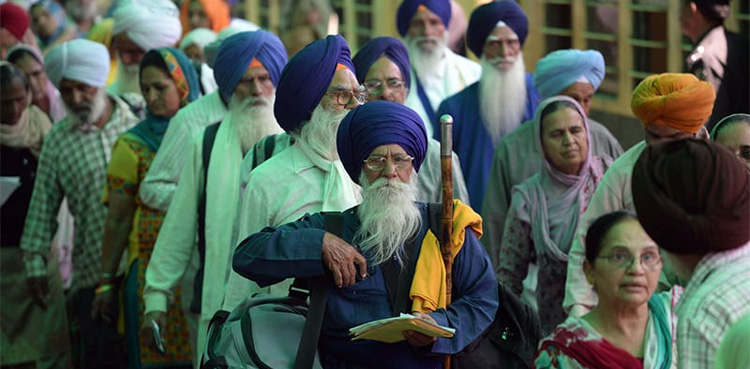
The Gurdwara Darbar Sahib Kartarpur in Pakistan and the Gurdwara Dera Baba Nanak in India are two historically significant Gurdwaras connected by the Kartarpur Corridor, inaugurated in 2019. This is the route that Sikhs may follow from India to reach the sacred shrine of Guru Nanak Dev Ji, the last resting place of the Sikh religion’s founder. The project exemplifies Pakistan’s steadfast support for religious tolerance and promotes Sikh pilgrimage to their sacred site. By eliminating the need for visas, Pakistan has played a role in bringing border residents together and putting their differences aside. In its attempts to promote solidarity, the Kartarpur Corridor symbolizes the region’s shared history and presence.
The Kartarpur Corridor, which allows Sikh pilgrims to travel visa-free, stands as a symbol of religious harmony in the face of persistent regional conflicts. Pakistan made a historic decision to open Guru Nanak Dev Ji’s mausoleum, Gurdwara Darbar Sahib Kartarpur, to worshipers every day from dawn to sunset, seven days a week. This project shows Pakistan is committed to promoting religious tolerance and interfaith peace. Pakistan is committed to peace and religious tolerance. This sets a strong precedent for working together in the face of animosity. The corridor is more than just a corridor; it signifies togetherness and optimism.
Pakistan has generously funded the construction of a network of roads and a bridge known as the Kartarpur Corridor, which connects the Indian and Pakistani sides of the Gurdwara Darbar Sahib Kartarpur. Well-planned roads and bridges not only physically separate countries, but they also serve as a bridge between their histories. Gurdwara Darbar Sahib Kartarpur, with its rebuilt and extended prayer rooms, accommodations, and other facilities, is a beacon of Sikh sunshine. Pakistan has implemented a small $20 entrance fee to demonstrate its dedication to religious harmony.
This money covers administrative and maintenance expenditures. With mutual agreement, Pakistan and India have scheduled the opening of the Kartarpur Corridor—a project that aims to foster religious tolerance and provide opportunities for people to meet—for 2019. With this price scheme, Pakistan’s dedication to promoting religious harmony and facilitating travel for Sikh believers goes beyond political hostility.
India has maintained a hard attitude toward Kashmir’s Muslim community. The United Nations has frequently called for a vote on Kashmir’s future, but India has maintained its troops stationed there and restricted human rights. In 2019, the repeal of Articles 370 and 35A exacerbated the situation for Kashmiris and increased tensions.
In contrast, Pakistan has constantly shown its willingness to promote religious tolerance. The Kartarpur Corridor, which connects India to the Gurdwara Darbar Sahib Kartarpur, illustrates this dedication. Pakistan hopes to foster positive relations with border residents by keeping the shrine immaculate and relaxing visa procedures.
The Indian government has downplayed the Kartarpur Corridor despite Pakistan’s significant attempts to highlight it. Instead of accepting the initiative as a bridge of goodwill, the Indian government has attacked it. These actions only reignite old grudges and destroy any hope of future cooperation. When Indian officials inflate baseless security concerns or contest Pakistan’s goals with the corridor, the positive impact diminishes.
The rationale for the $20 fee for pilgrims to use the Kartarpur Corridor is a mystery to many. The BJP-led Indian government, in contrast to Pakistan’s cheap cost, does not care about the real problems faced by its people. In its pursuit of economic expansion, the government disregards the concerns of youth, unemployment, and agricultural laborers. The disparity in expenses shows a failure to empathize and prioritize. The Kartarpur Corridor illustrates Pakistan’s dedication to religious harmony, whereas India’s conduct reveals an intricate interrelationship encompassing issues of legitimacy, security, and politics.
